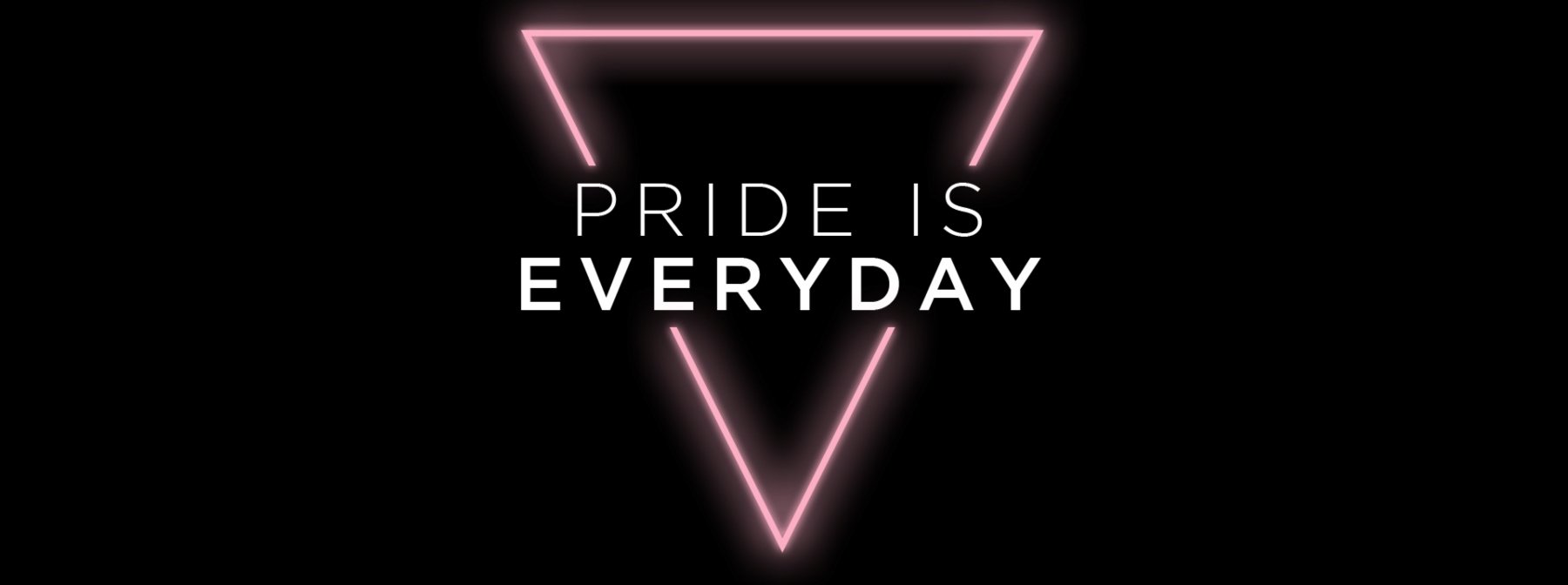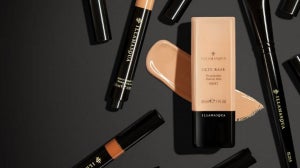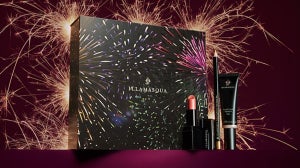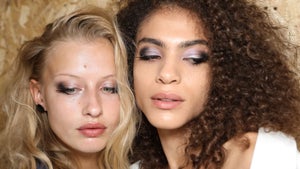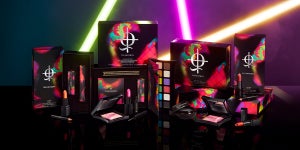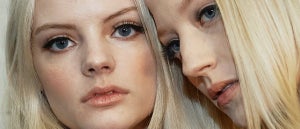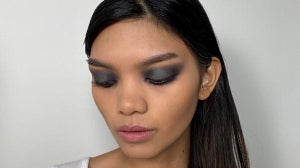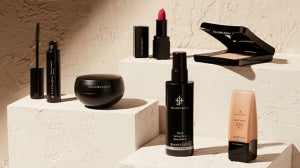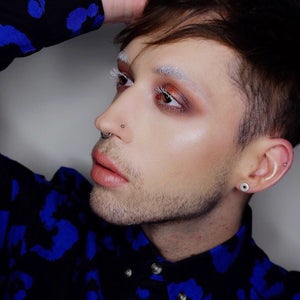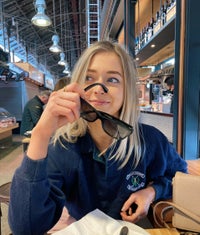
As we head into Pride month, we’re delving further into those from the LGBTQ+ community, whose representation of self goes beyond the traditional or classical perceived ideas of beauty and each of whom have their own unique story to tell.
As we navigate our lives, makeup is a tool and a vehicle we all use for self-discovery, a constantly evolving exploration with no fixed end point. We can all relate to the first piece of makeup we applied, be it a touch of mascara or a dab of lip balm, but through the years our techniques and applications evolve, along with our sense of self and how we present ourselves to the world. This journey goes beyond our external appearance, leading to an even greater sense of who, where, and how we take our place within society and our chosen communities.
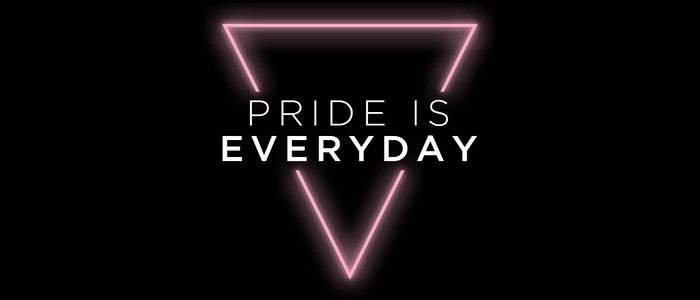
Pride is every day at Illamasqua. We start our LGBTQ+ story telling with Spencer, a model who recently took part in one of our campaigns. On location at a shoot, we spoke to Spencer about their newly discovered love of makeup, growing up queer in a small northern town and how they have found their place in the LGBTQ+ community in Manchester.
Let’s start with an introduction. Who are you?
I’m Spencer, aged 23. I really fell into modelling, so I’m not sure what I would be doing without it. I studied Fine Art at university, so maybe something within that. I think nowadays modelling is a lot about personality and who you are, especially in Manchester, because it’s a lot more commercial. In London it’s more about your image, so it tends to be a yes or no based on the way you look.
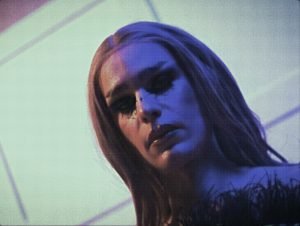
So, do you feel there is more representation in modelling now?
I think so, but I think they are definitely times when it’s just tokenism. For example, when it comes to modelling and Pride, you’re required to be there and come as a queer person, but not to fully represent who you are. There has to be more education as well. If people are going to be brought on to the team to do Pride shoots then there needs to be some education for those people. I’ve been on some shoots where people have been misgendered or they’ve had the old Pride flag and I’ve had to say something to them. I’d rather point it out, as it’s better for them. I’ve got friends who have done fashion week and they’re a drag queen; they’re brought on as the shock value or diversity card. It’s not necessarily the right representation of diversity across the board – they will have one person and they think that’s it they’re done.
Where are you originally from?
I’m originally from Preston and I think I’ll always have an infinity with it, but it was difficult growing up queer there. There is no scene whatsoever; I had to come to Manchester to experience anything like that. There wasn’t any queerness at all, so when I came out I could be gay but I didn’t know about all the different branches of sexuality and gender – there was just no education about it. All the things I’ve discovered about gender, sexuality and who I am have come from me educating myself and being surrounded and influenced by the community around me.
That must have been quite alienating for you.
I really hid myself a lot, keeping to the corner and being very quiet. There was a bit of bullying, especially in year 7 and 8, but I would keep myself quiet in the corner so I could keep out of everyone’s way, which is sad.
So, coming to Manchester allowed you to grow into yourself more?
I discovered so much more about myself and what it is to be queer, which previously I just didn’t know existed. I identify as non-binary, but for ages I didn’t know that was a thing. When growing up, I’d been told you are basically one thing or the other. Even with things like being trans, growing up I was led to believe you’re either trans or you’re not, but finding out that you can actually be something in between was huge for me. Being from a small town where there was no diversity, it was very alienating. I just didn’t know who I was. I couldn’t even discover who I was because I just had no idea of what that entailed. I have a cousin who is a similar age and we were always really close. Like brothers, we stuck together because we knew what it was like to grow up queer in the same place at the same time. We didn’t know it then, but in hindsight that is something that always happens; queer people stick together, even if you don’t know it. You grow up and then all your friends turn out to be queer and it makes sense, because we stuck together. Having my cousin was and is something I’m incredibly grateful for.
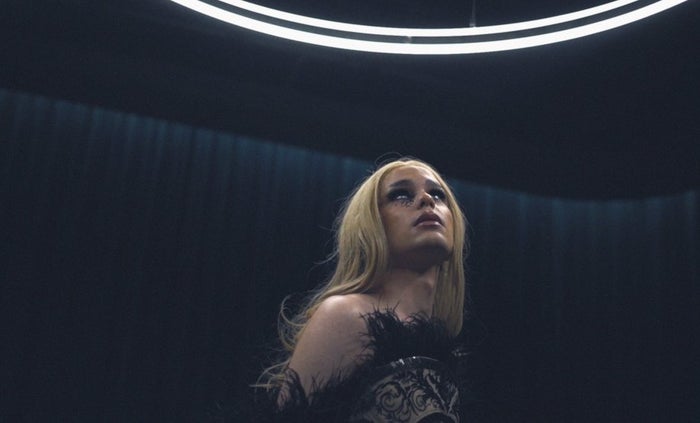
Was your family accepting when you came out?
They have always been great; I never had any problems with coming out. Even when you know your parents are accepting, it’s still a difficult thing to come to terms with within yourself and I continue to learn more and more about myself all the time. It’s also been a learning experience for them, which is good. There are some things that I don’t think they fully understand but they are willing to learn, which I think is the main thing. For example, I’ve had to teach them about different gender identities and the variations of these. I think it’s hard when people don’t understand things like non-binary or even bisexuality. In their eyes, you have to be one thing or the other. Some people also think they know better than you. I’ve had discussions before where it’s been said, ‘I’m older than you, so I know more’, but this is my lived experience – it’s who I am. I’ve educated myself, I live within the community and I live in my own skin. I’m just living my life, I’m not in anybody’s way. But then even if I was in anybody’s way that shouldn’t matter either, you should still respect my identity.
What pronouns do you prefer?
Just any, I’m not really too bothered. But then again, it’s not something I’ve fully discovered yet, which I kind of prefer. It’s just a constant evolving journey. I think some people get hung up on if you say you’re one thing and then you change your mind. As people we’re always constantly evolving, so sometimes those things can change. Right now I’m not too bothered, but that might evolve. It’s only been 2 years of this gender discovery for me; it started in lockdown as I was forced to look inwards, and actually came hand in hand with when I started doing makeup. Looking back at myself in old Instagram pictures, it’s like a different person. I was trying to be something I wasn’t.
What was your first step into makeup?
I started with brow gels before graduating onto blush and foundations, then to full drag during lockdown. Drag is something I’ve always wanted to do but I was too scared and I didn’t think I’d be good enough. I have this thing where if I’m not good at something immediately, I just think I’m not good enough and I don’t continue. When lockdown came, I had the time to concentrate and work on it and to be honest I picked it up quite quickly. Because of my Fine Art degree, I already understood shape, light and shade. I’ve only really been doing makeup for about 2 years now.
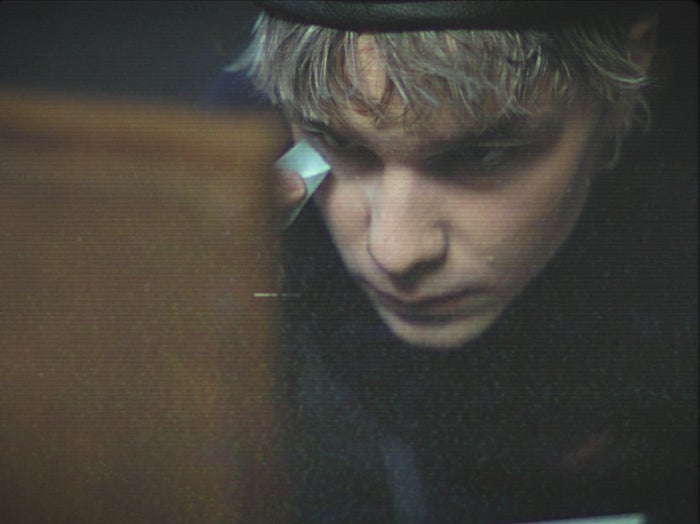
What have you learnt about makeup?
It’s another medium for my artistic expression and it brought me together with the people I love. It’s really allowed me to build a community around me. If I see someone on a night out and they’re full beat and looking amazing, I gravitate towards them because that’s what happens with queer people – there’s just a beautiful aura that pulls you together. I also love that makeup isn’t permanent, it’s very ephemeral. I was always interested in the concept of art that isn’t permanent; people get so fussy about things being perfect, but that’s the thing about makeup – you can wipe it off and start again.
Restarting again every day is beautiful, I love that about makeup. Somebody once told me to draw everyday as it keeps your mind active and the creativity flowing, I don’t do the traditional painting anymore, so this is my canvas now.
How would you describe your makeup style?
I can’t really describe my style; I wouldn’t say I have one. My everyday look is very natural; I just chuck something on, like blush or some gloss, so I look fresh. I would definitely wear some eyeliner if I was going into Manchester, however I never start with a plan when it comes to my makeup. I just go with it and I feel that’s when things are the most beautiful. It’s a lot of different things, whatever I’m feeling on the day. I love glitter, I always need to wear that somewhere.
How does social media affect you and your sense of self?
It’s been really important for me to build an online community through makeup. You see somebody, you message them and you get to become friends. Social media is very important within the queer community, especially if you grew up in a small town – it allows you to build that community of likeminded people. I’ve always had to do social media, especially with my job, but it does harbor a lot of insecurity in people and even in myself. Just looking at other people all the time, you can easily start to compare yourself to others. There have been times when I have done what I think is a great makeup look and then I go online and see somebody who looks amazing; it can make me feel bad about what I’ve done. It’s important to remember only to compete with yourself, just do you! Social media can feel like a competition – who has the most money, who is prettiest, who has the best photos – and in that way it can be very toxic. Most of the engagement I get is very positive. My followers are part of my community and people I know.
Do you get negativity about your makeup when you’re out?
All the time, but at this point I’m just used to it. People stare and I stare back, I kind of live for that, I’m used to it. It shouldn’t be like that, it’s just society and the world we live in, I love the way I look. A lot of times people are loud or they talk behind your back, but the minute you say something to them they always get really timid and quiet.
What advice would you have for somebody who is new to makeup and at the start of their journey?
Just take your time, it’s evolution. At the very beginning my makeup wasn’t like this, it was just a little bit of blush. When I was younger I was so scared of wearing nail polish, which is strange to me now, but it’s about those small steps and evolution.
How often do you do drag and what draws you to it?
About once a week. I don’t always go out in it either, sometimes I’m just in my room and then I wipe it off. I learned a lot of it through YouTube and through people I know. I always used to watch makeup tutorials, but then never did anything with it, so I had a good idea of what you’re supposed to do. The first couple of times I tried to do drag I just went for it and there was a lot of trial and error. If there were elements that weren’t working, then I would Google or YouTube it. I like it because to me it’s another art form, it’s so subversive. Sometimes, I like to go out and make people feel uncomfortable – I love that, just rocking the boat a bit. If I go out during the day wearing eyeliner – a look that I don’t think is particularly crazy – and I get stared at, then when I go completely out of the box with my drag makeup I expect stares. I’m almost looking for the attention.
What and who gets overlooked during Pride?
During Pride, it’s important to remember education and why we have it. More than anything, we need to fight for and support those that are most disenfranchised, for example the black and brown trans people of colour. We’re not all free until everybody is free, so while Pride celebrations are fun, it’s important to remember why it exists. Go to marches, educate yourself. You can’t just be part of the community for the good times, it’s important to be there for the bad times as well.

